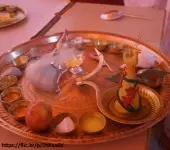Benefits of Godanam
- By donating even one cow, a person is freed from sins. (Mahabharata, Anushasana Parva, 71.51)
- By donating cows, a person uplifts seven generations of ancestors and seven generations of descendants. (Mahabharata, Anushasana Parva, 74.8)
- A person who donates one cow and one bull attains the fruits of studying the Vedas. By donating cows as per proper rituals, one attains superior worlds. (Mahabharata, Anushasana Parva, 76.20)
- Donating a young cow of noble qualities, covered with fine clothes, to a Brahmin, frees a person from all sins. Such a person does not go to Naraka. (Mahabharata, Anushasana Parva, 77.4-5)
- Cows are called the life (prana) of beings because they give milk. Donating a milk-giving cow is like donating life itself. The Vedic scholars say cows provide shelter to all beings. Hence, donating a cow means providing shelter to all. (Mahabharata, Anushasana Parva, 66)
Cows suitable for danam
- The following cows are considered suitable for donation:
- A cow that gives milk.
- A cow bought with honest wealth.
- A cow received as a gift due to one’s knowledge.
- A cow received from in-laws during marriage.
- A cow freed from suffering and captivity.
- A cow that came for self-sustenance.
Such cows are praiseworthy. Strong, well-behaved, and young fragrant cows are also considered praiseworthy. Among cows, the Kapila (reddish-brown) cow is the best, just as the Ganga is the best among rivers. (Mahabharata, Anushasana Parva, 73.41-42)
- A cow that is gentle, does not cause trouble while milking, has a beautiful calf, and does not run away after breaking the rope is considered ideal for donation. By donating such a cow, the donor enjoys happiness in the afterlife for as many years as there are hairs on the cow's body. (Mahabharata, Anushasana Parva, 73.44)
- A cow suitable for donation should be:
- Gentle in nature.
- Good at grazing on its own.
- Young and with a calf.
- Lawfully obtained.
- A milking cow.
Such cows should be donated to a Brahmin. (Skanda Purana, Prabhasa Khanda, Chapter 208)
Cows unsuitable for danam
- Donating an old cow without proper limbs destroys the donor's enjoyment. A lame, blind in one eye, or deformed cow leads to the donor's downfall and loss. Donating a very weak cow brings ruin to the donor's household. (Atharva Veda 12.4.3)
- Cows that cannot drink water, eat grass, or whose senses are weak, or that do not give milk, lead the donor to unhappy worlds. (Katha Upanishad 1.1.3)
- Donating a cow that:
- Cannot eat grass or drink water.
- Does not give milk.
- Has weak senses due to old age or illness.
Such a donation puts the Brahmin in trouble and sends the donor to terrible hells. (Mahabharata, Anushasana Parva, 77.5-7) - The following cows are unfit for donation:
- Barren cows.
- Sick or disabled cows.
- Ill-tempered cows.
- Old or whose calf has died.
- Illegally obtained cows.
- Distant or weak cows.
Donating such cows brings suffering and misfortune to the donor. (Skanda Purana, Prabhasa Khand, 278.23-25)
- A cow that causes trouble for the receiving Brahmin negates all the donor’s virtues. Such a donor cannot attain higher worlds. (Mahabharata, Anushasana Parva, 66)
Qualities of the recipient
- Donating ten cows to a Brahmin who is learned, has many children, and performs Agnihotra rituals leads to the donor attaining excellent worlds. (Mahabharata, Anushasana Parva, 69.16)
- A Brahmin is considered a suitable recipient of godanam if he is:
- Knowledgeable in Vedas.
- Of pure lineage.
- Calm and devoted to rituals.
- Fearful of sins and compassionate towards cows.
- Gentle, hospitable, and righteous.
A Brahmin who suffers without resources and needs a cow for farming, yajnas, nursing a woman, or caring for children should be given a milk-giving cow, even in ordinary circumstances. (Mahabharata, Anushasana Parva, 73.39-40) - Donations like cows, land, sesame, and gold must be given only to deserving Brahmins, not to undeserving ones. (Yajnavalkya Smriti)
- Instead of donating to ignorant Brahmins nearby, it is better to call a learned Brahmin from far away and donate to them. (Katyayana Smriti)
- A cow should never be given to:
- A sinful, greedy, or deceitful Brahmin.
- A Brahmin who neglects yajnas and shraddha.
- A person who asks for a cow to slaughter or for trade. Such donations lead the donor to great suffering. (Mahabharata, Anushasana Parva, 69.15; 66)
- Just as milk, curd, and ghee spoil in an unbaked pot, donating valuable items like cows, gold, or grains to an ignorant Brahmin destroys both the recipient and the merits of the donor. (Brihaspati Smriti)
- A Brahmin without penance or Vedic study drowns himself and the donor, just as a stone boat sinks with its passenger. (Manusmriti, Chapter 4.190)
Godana vidhi
- The donor should observe fasting before godanam.
- On the first day, invite a Brahmin and inform them about donating a cow the next morning.
- On the second day, arrange for a cow and say -
गौ मे माता वृषभः पिता मे दिवं शर्म जगती मे प्रतिष्ठा ।
'Cow is my mother; the bull is my father. May they bless me with happiness in this life and beyond.'
- Place the cow to be donated (along with its calf, if any) facing east.
- The donor should bathe, and stand near the cow's tail.
- The Brahmin receiving the donation should face north.
- Hold the cow's tail along with a vessel containing ghee and a piece of gold and chant:
यज्ञसाधनभूता या विश्वस्याघप्रणाशिनी । विश्वरूपः परो देवः प्रीयतामनया गवा ॥
'The divine cow, source of yajnas, destroyer of sins, and representing the Supreme, may it please Lord Vishnu.'
- Pour water on the right palm of the recipient and say prayers to the cows.
'Cows are life-giving, wise, and providers of immortality. They ensure prosperity and uphold the world's balance. May these divine beings destroy my sins and help me attain higher worlds.'
'Cows, like mothers, protect us. May their grace give me more than I ask for.'
'Cows bless those who serve them by curing diseases and breaking the bonds of worldly life. Be pleased, O cows, and grant me the ultimate path.'
Final Rituals
- The donor declares:
या वै यूयं सोऽहमद्यैव भावो युष्मान् दत्वा चाहमात्मप्रदाता ।
'O cow, you and I are one. By donating you, I have donated myself.'
- The recipient Brahmin responds:
मनश्च्युता मन एवोपपन्ना:सन्धुक्षध्वम् सौम्यरुपोग्ररुपा: ।
'Now you are mine. May these cows bless both the donor and me.'
- While taking the cows away, chant the Gomati Mantra as follows:
गावः सुरभवो नित्यं गावो गुग्गुलगन्धिकाः ।
गावः प्रतिष्ठा भूतानां गावः स्वस्त्ययनं महत् ॥
- Cows are always sacred and fragrant like incense.
- Cows are the foundation of all beings and bring great welfare.
अन्नमेव परं गावो देवानां हविरुत्तमम् ।
पावनं सर्वभूतानां रक्षन्ति च वहन्ति च ॥
- Cows provide the supreme food and the best offerings to the gods.
- They purify all beings, protect, and also serve.
हविषा मन्त्रपूतेन तर्पयन्त्यमरान् दिवि ।
ऋषीणामग्निहोतॄणां गावो होमप्रतिष्ठिकाः ॥
- With sacred offerings, cows satisfy the gods in heaven.
- For sages and those performing agnihotra, cows are the basis of oblations.
सर्वेषामेव भूतानां गावः शरणमुत्तमम् ।
गावः पवित्रं परमं गावो मङ्गलमुत्तमम् ॥
- For all beings, cows are the supreme refuge.
- Cows are the purest, highest, and most auspicious beings.
गावः सर्वस्य लोकस्य गावो धन्याः सुखावहाः ।
नमो गोभ्यः श्रीमतीभ्यः सौरभेयीभ्य एव च ॥
- Cows bless the whole world and bring happiness.
- Salutations to the cows, who are divine and fragrant.
नमो ब्रह्मसुताभ्यक्ष पवित्राभ्यो नमो नमः ।
ब्राह्मणाश्चैव गावश्च कुलमेकं द्विधाकृतम् ॥
एकत्र मन्त्रास्तिष्ठन्ति हविरेकत्र तिष्ठति ।
- Salutations to the daughters of Brahma, who are sacred and pure.
- Brahmanas and cows are one family, divided into two forms.
- In one, mantras reside, and in the other, offerings dwell.
After the donation, the donor must:
- Observe fasting for 3 more days.
- Spend one night in the cowshed.
Comments
Read more comments
Knowledge Bank
Works of Kalidasa
Mahakavyas- Kumarasambhava, Raghuvamsha. Other works- Malavikagnimitram, Abhijnanashakuntalam, Vikramorvashiyam, Meghaduta, Ritusamhara, Shyamala Dandakam.
What is the difference between Shruti and Smriti?
Shruti means a group of scriptures comprising of Veda Samhitas, Brahmanas, Aranyakas, and Upanishads. They are eternal knowledge revealed to the Rishis in the format of mantras. No authorship can be attributed to them. The Smritis, written by Rishis, are expositions based on the Shruti.
Recommended for you
The integrity of the great men of India

Three kinds of duty

Bhayaharaka Shiva Stotram

vyomakesham kaalakaalam vyaalamaalam paraatparam| devadevam prapanno'smi katham me jaayate bhayam| shoolahastam kri'paapoornam vyaaghracharmaambaram s....
Click here to know more..